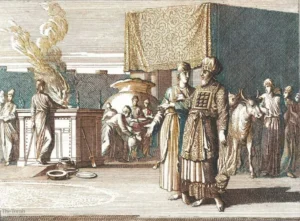THE PARASHA
“And if a sacrifice of wholeness (shelamim) is his offering: if he offers from the cattle, whether male or female, he shall offer it without blemish before Hashem.” Vayikra 3:1
RAV TZADOK’S REVELATION
RAV TZADOK reveals…a mysterious interpretation of the Zohar …and some fascinating parallel themes between: 1. the shelamim (wholeness) offering, 2. the incense offering that was used to consecrate the Mishkan, 3. the sacred life of our ancestor Yaakov [and] 4.The sanctity of Shabbos
DEDICATION OF THE ALTAR
[The Torah in Bamidbar details the dedication offering of the altar]. In the Zohar Rabbi Shimon Bar Yochai focuses on the weight of the golden spoons that were filled with the incense: “weighing ten shekels, ten shekels per piece.” He explains that the double reference of “ten shekels” alludes to a deep spiritual connection between the ten utterances that Hashem (G-d) pronounced in the creation of the universe and the Ten Commandments…. The correlation of the ten utterances and the Ten commandments suggests that the physical world achieves its highest level of perfection when it operates in accord with the Torah. Physicality and spirituality are not two separate realities. They are two integral parts of an entity that reaches its fullness and highest expression through a synthesis of the two.
The Zohar concludes that the incense offering is the most precious of all sacrifices. Rav Tzadok [explains that] the incense offering is comprised of eleven spices … burned together. Ten …have a pleasant fragrance. The eleventh spice…has a foul odor when burned on its own, [but] when burned together with the other ten it emits a pleasing smell. The ten good-smelling spices symbolize the righteous, whereas the foul-smelling spice symbolizes the sinners of the community. The incense offering teaches us that when the sinners are combined together with the righteous,…[then] the [inherent holiness of the] wicked …[is brought out by their] binding together with the righteous. When evil transcends into goodness, the name of Hashem is unified and elevated beyond any other form of service.
COMPARISON WITH SHELAMIM OFFERING
Compare this to the shelamim – the wholeness offerings [which] are on a lower level of sanctity [and is] reflected in the fact that all Jews are permitted to partake in eating the meat. However, despite their secondary level of holiness, the shelamim are the most cherished … of all of the animal sacrifices, One who brings a shelamim offering brings peace and completion into the world.
SHLEMIM COMPARED TO YAAKOV AND SHABBOS
Finally, let us compare the shelamim offerings to the life of…Yaakov and to Shabbos… Yaakov was unique in that he was able to imbue every aspect of physicality with the nobility of holiness (rather than a drive for egocentric self-gratification), centered on one supreme goal to fulfill the will of Hashem… Yaakov …succeeded in combining the physical and the material in a way that filled the world with Hashem’s oneness and holiness.
The first time that the word holy appears in the Scriptures is in connection with the day of Shabbos. Hashem sanctified the day of Shabbos with holiness from the very beginning of time. On Shabbos, we engage in physical pleasures (eating, drinking, etc.) for a spiritual purpose. Our physical acts are sanctified because in so doing we fulfill the mitzvah to honor the Shabbos…Our sages [teach] that Yaakov, in particular, observed the Shabbos and in that merit was worthy to inherit the entire creation. The sanctity of Shabbos and the holiness of Yaakov share a common theme: they both engender wholeness and completion through binding together the disparate worlds of the spiritual and the material.
We have seen the correlation between the shelamim (wholeness) offering, the incense offering, Yaakov, and Shabbos. This comes to teach us that if we want to become holy, we should walk in the footsteps of Yaakov. When we partake in a meal, the most primal of physical needs, let us do so with dignity and sanctity. The transformation of evil into goodness with the incense; the physical into the spiritual with the shelamim;and the mundane into the holy with Yaakov and Shabbos, are profound lessons that we can take with us and apply to every day of our lives.
Rav Tzadok HaKohen on the Parsha
Feldheim.com
DISCLAIMER:
The above excerpts/quotes are provided by Emor precisely as they appear in the original source, without any modifications or corrections to typos. Text within square brackets, as well as subtitles and bold formatting, are added by Emor for emphasis, clarification, or commentary, and the original content has not been changed.

